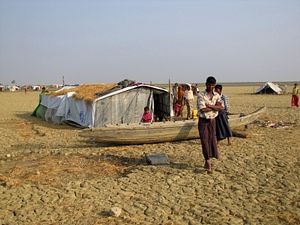After heavy rains, with forecasts of more to come, the plight of the Rohingya remains precarious despite an agreement signed between Myanmar and the United Nations early this month that should enable a safe return to their homes.
The memorandum of understanding calls for a framework of cooperation that will lead to the “voluntary, safe, dignified, and sustainable” repatriation of some 700,000 Rohingya refugees back to their homes or their place of choosing.
It follows an initial repatriation agreement reached in November that has failed to win much confidence among the predominantly Muslim Rohingya, who fled a violent and bloody crackdown that escalated in northern Myanmar last August, sparking an exodus.
This agreement, according to the UNHCR, “is the first and necessary step to support the government’s efforts to change that situation and is also intended to support recovery and resilience-based development for the benefit of all communities living in Rakhine State.”
The UN will be given access to western Rakhine State, to assess and carry out protection activities and provide information for refugees about conditions at home before deciding whether to return.
However, the government of Aung San Suu Kyi is sill insisting that only refugees with the correct identity documents can return. International condemnation and claims the crackdown was simple ethnic cleansing went ignored.
Suu Kyi had hoped to restore her battered reputation when she allowed UN human rights and development organizations into enter Myanmar ahead of signing the MoU while laying the groundwork for a large-scale repatriation at the same time.
She also allowed senior diplomats from each of the 15 UN Security Council member states to travel to Myanmar on a fact-finding tour. That was considered yet another watershed moment, following on from a visit by Pope Francis in November, where he did use the term “Rohingya,” much to the chagrin of many in Myanmar who prefer the ethnically-loaded term “Bangla” alongside other derogatory terms.
But the Rohingya, who remain stuck with the annual monsoon now under way – living in tents and makeshift housing of plastic and bamboo – are facing floods and landslides, and deaths have already been reported.
“We were very scared…” Nabi Hossain told ITV News. “There were 10 to 15 houses above us which started to collapse, and all the mud and water was coming down into our home.”
A primary step is to repatriate 6,000 refugees caught in a no man’s land around the border that divides Myanmar and Bangladesh.
The Rohingya have also been dogged by their own internal power struggles while staging protests, the most recent on World Refugee Day when demanding Myanmar ends its racist policies and grant them citizenship.
Their fears were then heightened by the killing of Arif Ullah, an important community leader who worked closely with Bangladeshi officials and was a frank critic of the Arakan Rohingya Salvation Army (ARSA). That insurgent group had prompted the August military crackdown after it launched attacks against on government security forces, killing at least 12 people. Arif was hacked to death.
In signing the MoU, UN Secretary-General António Guterres urged Myanmar to take “decisive steps to implement the agreement” that includes an end to violence, accountability for perpetrators and redress for victims. The UN also wants assurances that refugees “can return voluntarily in safety and dignity.”
As with many close observers of the Rohingya situation, the UN no doubt realizes that the current circumstances make many of these asks unlikely. Nonetheless, the fact remains that while debates about the extent of incremental progress on this issue can continue to be had at the general level, there are very specific and immediate challenges that the Rohingya continue to face that could worsen their plight still further.
Luke Hunt can be followed on twitter @lukeanthonyhunt

































